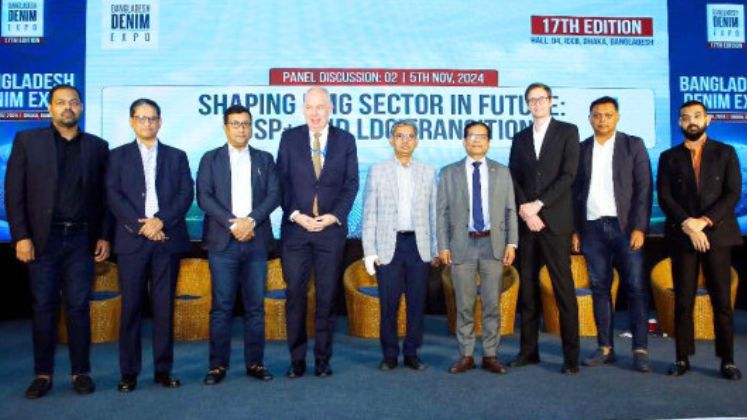
On 5th November, the 17th Bangladesh Denim Expo, a well-known international trade expo, concluded at the International Convention City in Bashundhara, Dhaka. Over 45 exhibitors from seven different nations participated in the two-day event, which was organised by Bangladesh Apparel Exchange and showcased a broad range of denim items, textiles, accessories, chemicals, and technology. Over 5,543 people from 56 different nations attended the event.
A panel discussion on the second day, Shaping RMG Sector in Future: GSP+ and LDC Transition, examined Bangladesh’s impending departure from the Least Developed Country (LDC) classification by 2029 and the imperative requirement to get GSP+ eligibility in order to maintain market access.
The difficulties Bangladesh confronts in fulfilling future aspirations were highlighted by moderator M Riaz Hamidullah, assistant foreign secretary (Multilateral and Regional) of the Ministry of Foreign Affairs, who said that “liberty, inclusion, and transparency will be key.” He emphasised the significance of labour rights as an industry value proposition.
In his optimistic assessment of the Bangladesh Ready-Made Garment (RMG) industry’s future, Professor Mustafizur Rahman of the Centre for Policy Dialogue (CPD) recommended that buyers and brands support local entrepreneurs in areas such as labour compliance and technology transfer.
Bangladesh’s reliance on the apparel industry was emphasised by Dr. Mostafa Abid Khan of the Support for Sustainable Graduation Project (SSGP), who described it as a “success story” for the EU and said that continued access to GSP+ depends on adherence to EU due diligence criteria.
The European Union Delegation to Bangladesh’s Edwin Koekkoek emphasised that decarbonisation is a priority for Bangladesh’s future while highlighting the nation’s progress in environmental and labour rights norms.
Leaders in the industry agreed, with Mohammad Sohel Sadat of the Shin Shin Group advocating for better working conditions and education for workers and entrepreneurs. In order to improve working conditions in factories, Ole Rosenborg Justesen of the Danish Embassy stated that labour inspections and infrastructure improvements are vital.
In order to remain competitive, Shah Rayeed Chowdhury of Evince Group emphasised the value of preserving solid relationships with buyers while making investments in automation and team growth. H&M’s Ziaur Rahman agreed that suppliers needed to be more knowledgeable about labour rules and due diligence.
The expo’s talks emphasised the need for cooperation from all parties involved, including companies, governmental organisations, and non-governmental organisations, in order to promote better working conditions and guarantee a long-term viability of Bangladesh’s RMG industry.






